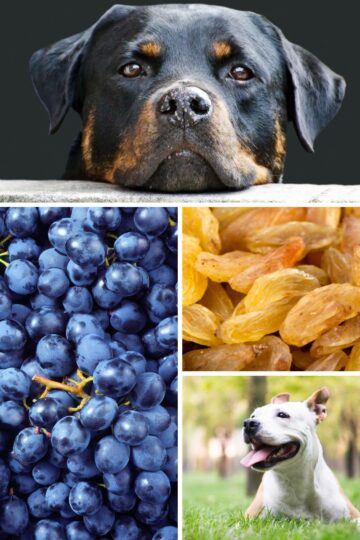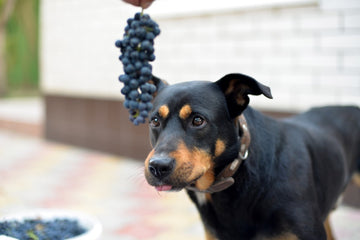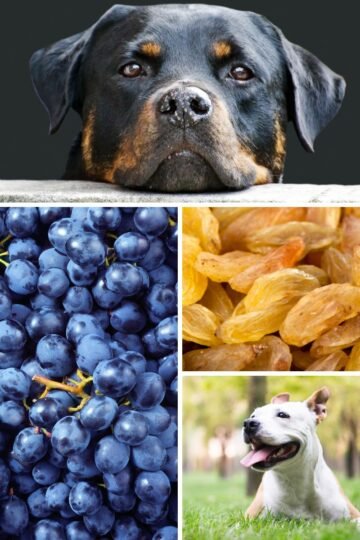When it comes to the dietary preferences of Dobermans, one might wonder if these elegant and athletic dogs can enjoy the deliciousness of grapes. It’s a valid concern, as some fruits can be harmful to our furry friends. So, can Dobermans eat grapes? Well, the answer might surprise you!
Dobermans should not consume grapes or any grape products. Grapes, including raisins, can be extremely toxic to dogs, causing kidney failure and other severe health complications. Even a small amount of grapes can be dangerous for Dobermans, so it’s best to keep these fruits far away from your furry companion. If your Doberman accidentally ingests grapes, it’s important to seek immediate veterinary attention to prevent any potential harm.
It is not recommended to feed grapes to Dobermans. Grapes and raisins can be toxic to dogs and may lead to severe kidney damage or failure. It’s best to avoid giving them grapes or any grape products as a precaution. Stick to dog-friendly fruits like apples or bananas as an alternative treat for your Doberman.

Can Dobermans Eat Grapes?
Many pet owners wonder if it is safe to feed their Dobermans grapes. Grapes are a popular fruit and some dogs enjoy them as a treat. However, grapes can be toxic to dogs and may cause serious health issues. In this article, we will explore whether or not Dobermans can eat grapes and discuss the potential risks involved.
Why Grapes Can Be Toxic to Dogs
Grapes and raisins can be toxic to dogs, including Dobermans. While the exact substance in grapes that is harmful to dogs is unknown, it is believed to be present in both the flesh and the skin of the fruit. Dogs can develop severe symptoms after consuming even a small amount of grapes or raisins, such as vomiting, diarrhea, and kidney failure. The toxicity can vary between dogs, as some may be more sensitive than others. It is important to note that the toxic effects of grapes can occur regardless of the dog’s size or age.
The symptoms of grape toxicity in dogs can appear within a few hours or may be delayed for up to 24 hours. It is crucial to seek veterinary assistance immediately if you suspect your Doberman has ingested grapes. Prompt treatment can increase the chances of a full recovery.
It is worth mentioning that not all dogs will experience grape toxicity. Some dogs may be able to consume grapes without any adverse effects. However, because the consequences can be severe, it is best to err on the side of caution and avoid feeding your Doberman grapes altogether.
Alternatives to Grapes for Dobermans
If you’re looking for safe and healthy alternatives to grapes for your Doberman, there are several options to consider:
- Apples: Apples are a great snack for dogs and provide essential vitamins and fiber. Just make sure to remove the seeds and core before offering them to your Doberman.
- Blueberries: Blueberries are packed with antioxidants and are safe for dogs to enjoy in moderation. They can be given as a treat or added to your Doberman’s meals.
- Carrots: Carrots make an excellent low-calorie snack for dogs and can contribute to their dental health. You can give them raw or cooked, but avoid seasoning or adding any spices.
- Watermelon: Watermelon is a refreshing and hydrating treat for dogs. However, make sure to remove the seeds and rind before offering it to your Doberman.
- Pumpkin: Pureed pumpkin is a nutritious ingredient that can be added to your Doberman’s meals. It is high in fiber and can aid in digestion.
Remember to introduce new foods gradually and monitor your Doberman for any adverse reactions. It is always a good idea to consult with your veterinarian before making any significant changes to your dog’s diet.
Preventing Accidental Ingestion
To ensure the safety of your Doberman, it is essential to take preventive measures to avoid accidental ingestion of grapes or raisins. Here are some tips:
- Keep grapes and raisins out of reach: Store grapes and raisins in a secure place where your Doberman cannot access them. This includes keeping them off countertops and tables.
- Educate family members and visitors: Inform everyone in your household, as well as guests, about the dangers of grapes and raisins for dogs. Remind them not to leave these fruits within reach of your Doberman.
- Read product labels: Some foods and beverages may contain grapes or raisins as ingredients. Check the labels of packaged products, especially those that are sweet or contain dried fruits, before sharing them with your Doberman.
By implementing these preventive measures, you can minimize the risk of accidental grape ingestion and ensure the well-being of your Doberman.
When to Seek Veterinary Care
If you suspect that your Doberman has ingested grapes or raisins, even in small quantities, it is essential to contact your veterinarian immediately. They will be able to provide guidance based on your dog’s specific situation.
The veterinarian may induce vomiting to remove any remaining grapes from the stomach and administer activated charcoal to prevent absorption of the harmful substances. Additionally, they may recommend blood tests to assess kidney function and initiate appropriate treatment if needed.
Never attempt to induce vomiting at home without consulting a veterinarian first, as it can be dangerous or contraindicated depending on the circumstances.
Conclusion
In conclusion, it is not safe for Dobermans to eat grapes or raisins due to their potential toxicity. Even small amounts can lead to severe health issues, including kidney failure. As responsible pet owners, it is crucial to avoid feeding grapes or raisins to your Doberman and take preventative measures to ensure they don’t accidentally ingest these fruits. Instead, opt for safe alternatives like apples, blueberries, carrots, watermelon, or pumpkin. If your Doberman ingests grapes or raisins, contact your veterinarian immediately for guidance and prompt treatment. By prioritizing your Doberman’s well-being and being mindful of their diet, you can help keep them happy and healthy for years to come.
Key Takeaways: Can Dobermans Eat Grapes?
- Grapes are toxic to dogs, including Dobermans, and can cause kidney failure.
- Even a small amount of grapes can be harmful to your Doberman, so it’s best to avoid feeding them grapes altogether.
- If your Doberman accidentally eats grapes, it’s important to seek immediate veterinary attention.
- Signs of grape poisoning in dogs include vomiting, diarrhea, weakness, and decreased appetite.
- Always keep grapes and raisins out of reach of your Doberman to prevent accidental ingestion.
Frequently Asked Questions
The following are some commonly asked questions about feeding grapes to Dobermans.
1. Are grapes safe for Dobermans to eat?
Answer:
No, grapes are not safe for Dobermans to eat. Grapes and raisins can be toxic to dogs and can cause severe kidney damage. Even a small amount of grapes can be harmful, so it is best to avoid feeding them to your Doberman.
If your Doberman accidentally ingests grapes or raisins, it is important to seek veterinary care immediately. The symptoms of grape or raisin toxicity may include vomiting, diarrhea, decreased appetite, abdominal pain, and increased thirst and urination.
2. Why are grapes harmful to Dobermans?
Answer:
The exact cause of grape toxicity in dogs is unknown. However, it is believed that a substance within grapes and raisins can cause damage to the kidneys, leading to kidney failure. Not all dogs are affected by grapes, but Dobermans are particularly susceptible to this toxicity.
It’s important to note that the toxicity of grapes and raisins can vary from dog to dog. Some dogs may experience severe symptoms after ingesting a small amount, while others may not show any signs of toxicity. Regardless, it is best to avoid feeding grapes to Dobermans altogether.
3. Can Dobermans eat other fruits?
Answer:
Yes, there are many fruits that Dobermans can safely enjoy. Some dog-friendly fruits include apples, bananas, blueberries, strawberries, and watermelon. However, it is important to remove any seeds, pits, or cores before offering fruits to your Doberman, as these can be choking hazards or cause digestive issues.
Remember to introduce new fruits gradually and in moderation, as some dogs may have sensitivities or allergies to certain fruits. Always consult with your veterinarian before adding any new foods to your Doberman’s diet.
4. Are there any alternatives to grapes for training treats?
Answer:
Absolutely! There are plenty of safe and healthy alternatives to grapes for training treats. Some options include small pieces of cooked chicken, turkey, or lean beef; freeze-dried liver treats; small cubes of cheese; or specialized dog training treats that are formulated to be tasty and beneficial for training purposes.
It’s important to choose treats that are appropriate for your Doberman’s size and dietary needs. Also, be mindful of the portion sizes to avoid overfeeding and maintain a healthy weight for your dog.
5. What should I do if my Doberman accidentally eats grapes?
Answer:
If your Doberman accidentally eats grapes or raisins, it’s crucial to take immediate action. Here are the steps to follow:
1. Contact your veterinarian: Call your vet and provide them with information about the amount of grapes or raisins ingested, as well as your dog’s weight and any symptoms they may be experiencing.
2. Induce vomiting (if instructed): Your vet may advise you to induce vomiting at home. This should only be done under their guidance or veterinary supervision to ensure it is safe for your dog.
3. Seek immediate veterinary care: Even if your dog doesn’t show any symptoms immediately, it’s important to have them examined by a veterinarian. The vet may recommend blood tests and provide appropriate treatment to prevent kidney damage.
Remember, the sooner you seek veterinary care, the better the chances of preventing any potential complications from grape or raisin ingestion.

In summary, it is important to know that Dobermans should not eat grapes or raisins.
Grapes and raisins can be toxic to dogs, causing symptoms such as vomiting, diarrhea, and even kidney failure. It’s best to keep these fruits away from your Doberman and provide them with safe and nutritious alternatives.
